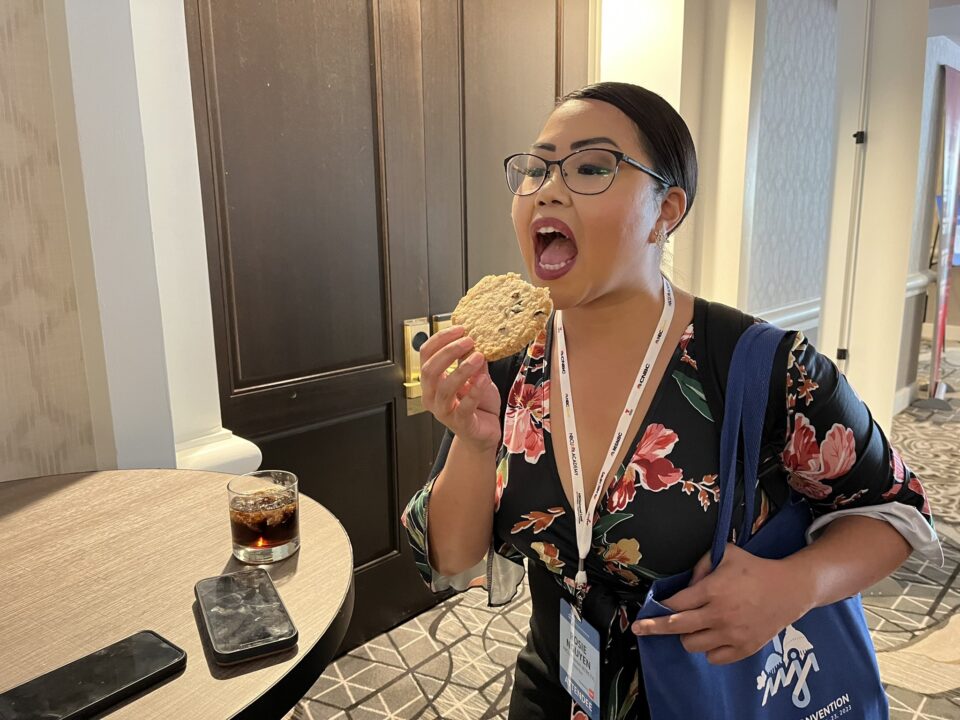Will Sampling Barbecue Surpass Meatier Concerns?
Ray Metoyer Dies at 72, Mentor and NABJ Exemplar
NABJ Hosting Sessions on Martha’s Vineyard
Easier for the Rich to Be Admitted, Study Shows
Reporter Called N-Word Covering Country Concert
N.Y. Mayor Wants $500,000 to Promote J-Diversity
Homepage photo: Rosie Nguyen of KTRK-TV in Houston samples the treats at the AAJA Texas party at the AAJA national convention. (Credit: Twitter)
Support Journal-ismsDonations are tax-deductible.
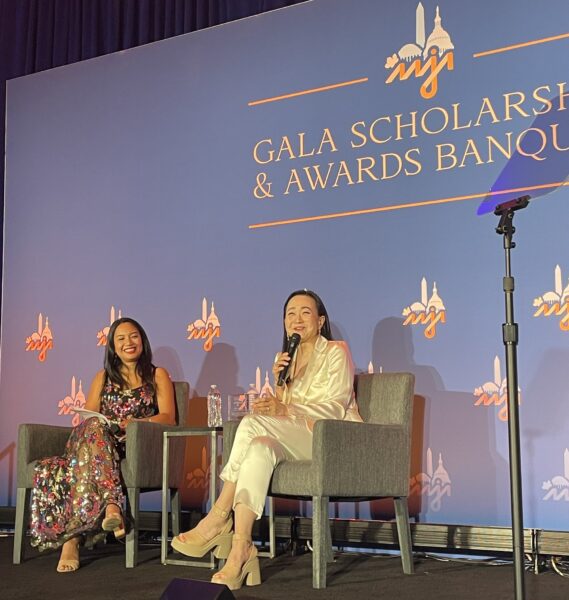
Will Sampling Barbecue Surpass Meatier Concerns?
The Asian American Journalists Association Saturday unveiled its convention site for 2024: Austin, Texas, touted for its barbecues and “thought leaders,” but made no mention of the state’s newsmaking border issues, government hostility to affirmative action or imposition of strict curbs on abortions.
[Monday update: “Justice Department Files Complaint Against the State of Texas for Illegally Placing Floating Buoy Barrier in the Rio Grande“]
The announcement — traditionally a surprise — came at the end of a Washington, D.C., gathering that attracted 1,500 attendees, according to AAJA leaders, and a broad array of workshops in which speakers discussed how to counter “erasure” of Asian Americans and their concerns, the diversity among Asian Americans themselves and the evergreen topic of how to succeed in the profession.
Texas has a growing Asian population, 5.7 percent in the 2020 Census, but by and large, this was not a time for politics, external or internal. There was no membership meeting or board meeting publicized on the schedule, partly owing to the legacy of a lack of in-person meetings during the COVID pandemic, AAJA President Nicole Dungca told Journal-isms. She quickly ended the conversation to participate in a photo op.
Awareness of the political climate has sometimes figured in the choice of journalists-of-color convention sites going back at least to the 1990s, though not so much with AAJA. In 1999, Unity: Journalists of Color, the late coalition of Black, Hispanic, Asian American and Native American journalists associations, met in Seattle despite a Washington state vote against affirmative action. The National Association of Black Journalists objected.
In 1994, Native Americans had concerns about Atlanta as the Unity site because Georgia’s government helped instigate the brutal 1838 removal of the Cherokees.
This year, as the National Association of Hispanic Journalists prepared to meet in Miami, board members moved to express support for the LGBTQ+ community in the state as that community complained of hostility from the administration of Gov. Ron DeSantis and Republican legislators (scroll down).
The choice of Texas was announced at the end of a conference largely focused on other concerns. The student news project, AAJA Voices, featured stories such as “How one of Filipino America’s last newspapers folded,” ‘What three cities’ fights say about Chinatown’s identity” and “These Asian immigrants can’t vote in 2024. But they’re finding ways to be heard.”

There were occasions such as “AAJA on the Hill” — “You’re invited to an exclusive evening at the United States Capitol with Members of Congress and leaders in the caregiving community,” an email from the organization said. “Masters of Ceremonies are our own Vicky Nguyen (NBC News) and Juju Chang (ABC News). With Special Remarks from Lisa Ling (CBS News) and David Ono (ABC News). Plus a screening of UNCONDITIONAL, a film by Richard Lui, and music from Jay Allen of ‘The Voice.’ ”
But perhaps more important for members, they were among other Asian American journalists and had the opportunity to celebrate one another.
Such gatherings “remind me I’m not alone,” Michael Kim, known as the godfather of AAJA’s Sports Task Force and a pioneer for Asian Americans in sports broadcast journalism, told the gala-night audience. On the job, Kim said, he is usually the only Asian American in the room.
Chenue Her, identified as ” ‘Good Morning Iowa’/Midday Anchor & Traffic,” tweeted, “I’m overjoyed at the Hmong representation at this year’s @aaja convention in DC. I’ve never seen this many Hmong journalists at the convention before.”
.
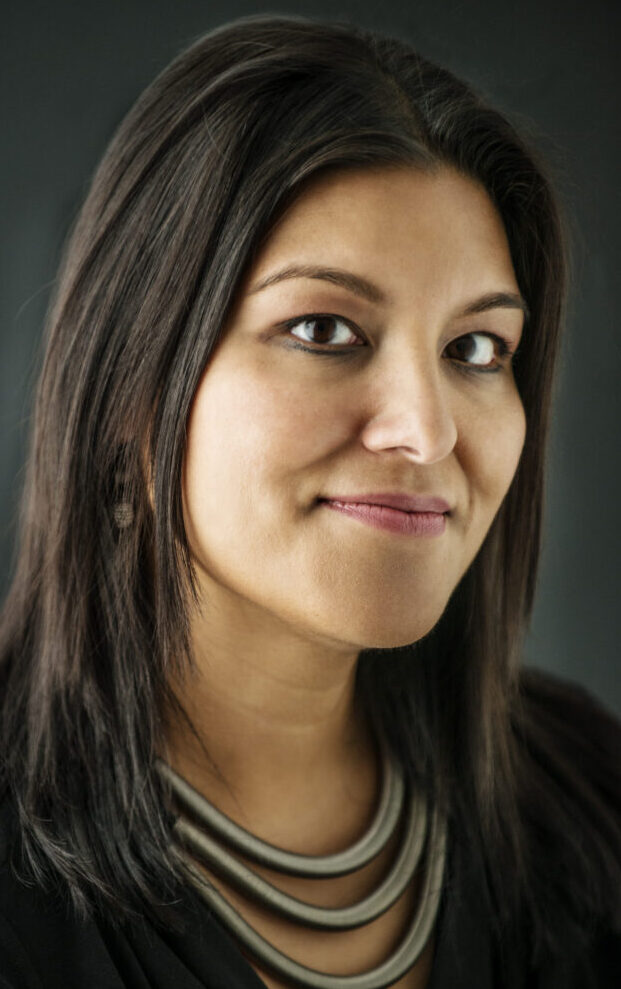 S. Mitra Kalita (pictured) is most recently the co-founder of URL Media, a network of Black and brown-owned news outlets that share content, distribution and revenue. She messaged Journal-isms Sunday that she thought the convention “was terrific — professional but soulful. It felt like people really tried to weave the diversity of Asian America into every conversation. There was a real recognition that we are a community of communities and I felt an effort to address the needs of, say, native Hawaiians and Pakistani-American Muslims. My panel was on disinformation and, similarly, the lens through people of color changed and upgraded that conversation to be concrete and actionable.
S. Mitra Kalita (pictured) is most recently the co-founder of URL Media, a network of Black and brown-owned news outlets that share content, distribution and revenue. She messaged Journal-isms Sunday that she thought the convention “was terrific — professional but soulful. It felt like people really tried to weave the diversity of Asian America into every conversation. There was a real recognition that we are a community of communities and I felt an effort to address the needs of, say, native Hawaiians and Pakistani-American Muslims. My panel was on disinformation and, similarly, the lens through people of color changed and upgraded that conversation to be concrete and actionable.
“Also this AAJA I saw more Black journalists and hiring managers which elated me. Obviously you know URL Media is a big believer in the power of the collective. That presence is very important to building coalitions to squelch white supremacy and divisive rhetoric.”
The diversity among descendants of the broad swath of the globe from South Asia to the Pacific Islands was highlighted on a Friday panel, “Covering the Diversity of the South Asian Experience in the U.S.,” produced by the South Asian Journalists Association.
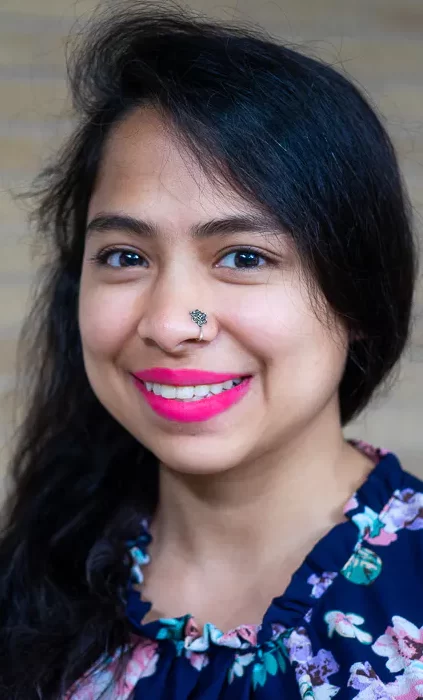 “This conference is about our collective power, telling other people that we are not a monolith,” SAJA President Mythili Sampathkumar, who moderated the panel, told the attendees.
“This conference is about our collective power, telling other people that we are not a monolith,” SAJA President Mythili Sampathkumar, who moderated the panel, told the attendees.
Samira Sadeque (pictured, above), who writes often about Americans from Bangladesh, said, “They bring their local politics here, sometimes almost to a fault. “There have been fights,” she added, also mentioning that in the home country, “Our government is cracking down on any level of dissent.”
Sadeque recalled writing about COVID among Bangladeshis in New York. “They’re so used to not being” included in such reports, she said.
India Today reports on the attacks and online harassment targeting Wall Street Journal reporter Sabrina Siddiqui after her question to Indian Prime Minister Narendra Modi at a White House news conference. (video) (Credit: India Today/YouTube)
When Wall Street Journal reporter Sabrina Siddiqui’s questioning of visiting Indian Prime Minister
Narendra Modi at the White House last month prompted threats to Siddiqui in India, Sampathkumar said, “We got harassed and threatened and all kinds of things” at SAJA.
Farnoush Amiri, a New York-based Iranian American journalist who works at the Associated Press, said she never takes for granted the freedom of the press in the United States. When she questions the speaker of the House, for example, “you could get killed . . . for doing that in Iran or Afghanistan — or you could get censored.” It’s a response she gives her parents or those of similar mindset who ask why she doesn’t choose a more traditional profession such as law or medicine.
Her explanations have succeeded. “They now truly value journalism is a way they weren’t used to,” Amiri said.
Sabrina Malhi, a Washington Post health reporter who also writes such pieces as “Anti-Blackness Goes Back To Ancient Times,” said Asian Americans are often left out of reports about hate crimes, and yet, “I’ve never been this scared of being a South Asian person in America.” Malhi explained that “there are a lot of Asian men who are targeted,” particularly among the unhoused.
Many of the workshops focused on solutions. About the unhoused, for example, Will Schick, editor of Street Sense Media in Washington, told a Friday panel on “How to Report on Homelessness” that his newspaper has prepared a guide on covering that subject and is updating it.
On Thursday, AARP announced “The first-ever research panel designed to scientifically represent Asian American, Native Hawaiian, and Pacific Islander communities,” a collaboration with the National Opinion Research Center, known as NORC, at University of Chicago.
“Amplify AAPI will illuminate the needs, opinions, and experiences of AANHPIs [Asian American and Native Hawaiian/Pacific Islanders], which researchers, policymakers, businesses, and marketers can then rely on to make decisions. Through its rigorous, scientific approach, Amplify AAPI will help end racial inequities and stereotypes that lead to unequal access to social service programs, consumer goods, and other important facets of society,” NORC said.
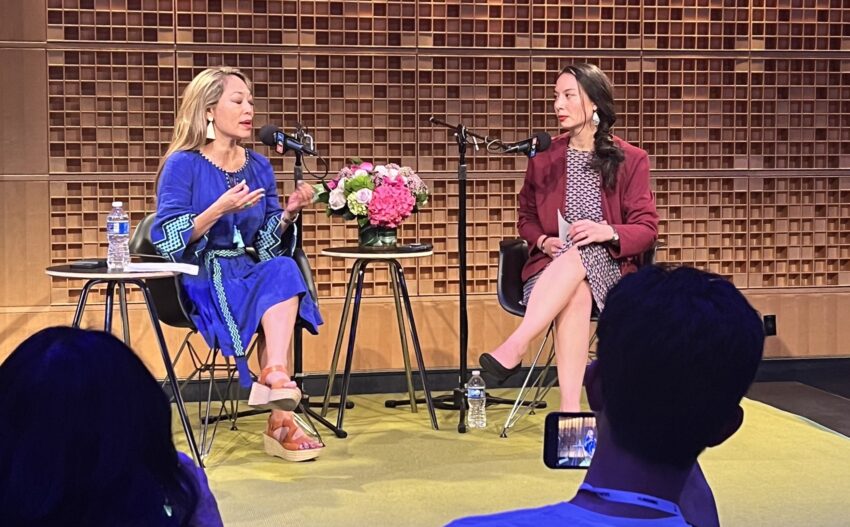
Some traveled away from the Capital Hilton, the convention hotel, for programs and receptions sponsored by news organizations. At NPR headquarters, Ailsa Chang, the first Asian American host at the network, conversed on stage with reporter Emily Kwong. Chang said she left a law career to figure out what she really wanted to do and found journalism.
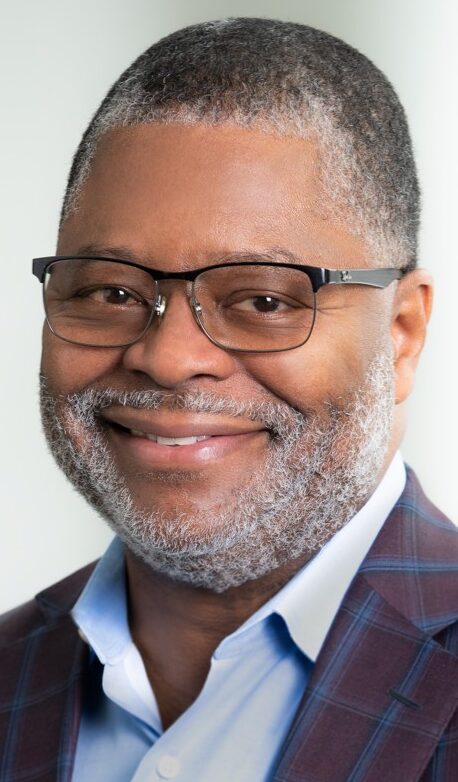 “She talked about the work she does to listen to and incorporate feedback without losing her authentic self,” recalled Duchesne Drew (pictured), president of Minnesota Public Radio. “She talked about assessing the value of the feedback. . . . some of it is helpful and gets at things that can undermine her ability to effectively communicate. And some of it is racist and sexist.
“She talked about the work she does to listen to and incorporate feedback without losing her authentic self,” recalled Duchesne Drew (pictured), president of Minnesota Public Radio. “She talked about assessing the value of the feedback. . . . some of it is helpful and gets at things that can undermine her ability to effectively communicate. And some of it is racist and sexist.
“Emily talked about being biracial and moving in both worlds (white and Asian/Chinese) but not being fully accepted in either of them. She also talked about studying Chinese as a way of connecting with and showing appreciation for her father. I was really struck by her vulnerability as well as resilience in facing hard things.
“It was the best session I attended. I was moved by the resonance their comments had with the audience, a room full of Asian American journalists trying to navigate white spaces as themselves,” concluded Drew, a Black journalist.
Many of the themes were repeated at the sold-out scholarship and awards banquet Saturday, but there were surprises.
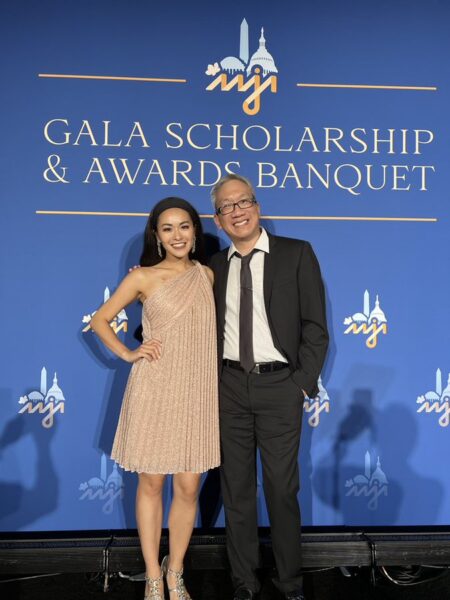
Co-hosts Aimee Cho, reporter at WRC-TV in Washington, and Washington Post sports reporter Gene Park each announced being seven months cancer-free after being diagnosed with the disease last year.
The late Henry Fuhrmann, an AAJA stalwart and retired Los Angeles Times editor who covered last year’s AAJA convention for Journal-isms, was remembered by his wife, Lindi Dreibelbis, as a video amplified her remarks. Fuhrmann won the organization’s Lifetime Achievement Award last year.
Jin Ding, chief of staff and operations for the Center for Public Integrity and a leader of the Convention Programming Committee, was named member of the year.
Sahan Journal, which says it “seeks to illuminate issues affecting Minnesota immigrants and communities of color and to chronicle how these communities are changing and redefining what it means to be a Minnesotan,” was given AAJA’s 2023 Community Engagement Award.

Amna Nawaz, who this year became co-anchor of the “PBS NewsHour,” was honored with the President’s Award. In videotaped remarks, Nawaz pleaded for journalists to look after their mental health and paid tribute to the pioneers who opened doors for her. She urged others to do likewise, and strongly advised members to consult the AAJA website for more information about mental health wellness resources.
Nawaz said she was taking her own “self-care” advice and was on vacation with her family.
The speaker who garnered the most attention — with one- and two–liners repeated on social media and rewarded with a lusty standing ovation — was Min Jin Lee, author of “Free Food for Millionaires” and “Pachinko.” She won AAJA’s Visibility Award. Lee was interviewed in a “fireside chat” with Dungca, the AAJA president.
Some of the quips:
“I didn’t know what a white person was until I went to Yale,” referring to her New York upbringing, where people were identified more by their family’s country of origin, i.e., Italians, Irish, Poles, etc.
On why she organized like-minded advocates when Korean studies weren’t being taught at Yale: “You cannot erase me and you cannot erase the things I care about.”
“If you f–k with writers, you do so at your own peril.”
“I don’t think we were . . . asking Jane Austen, ‘Why are you writing about white women?’ ‘”
The current media portrayal of Asian Americans is “somewhere between model minority and a hot mess.”
“I’m a big proponent of race-based affirmative action …. I’m tired of people not talking about the feelings of Asian American kids. They feel they’re being unheard.”
“The word ‘overrepresented’ is so hurtful. Imagine you are a 15-16-17 year old. . . .”
“I know the people being assaulted are poor people. . . .
“If your editor tells you we’ve had too many of those stories, tell them to f–k off.”
- Asian American Journalists Association: 2023 Journalism Excellence Awards Highlight Impact and Value of AAJA Journalists (May 30)
- Asian American Journalists Association: JCamp
- Asian American Journalists Association: AAJA Selects JCamp 2023 Cohort (April 28)
- Borderzine series: Our border life
- Isabelle Chapman, CNN: Nearly two years after Texas’ six-week abortion ban, more infants are dying
- Chronicle of Philanthropy: Elbert Ventura named editor-in-chief of The Chronicle of Philanthropy
- Colbi Edmonds and Nicholas Bogel-Burroughs, New York Times: Bungled Hiring of Journalism Director Exposes a Rift at Texas A&M
- Baylee Friday, Savannah Jones and Chris Blake, KXAS, Dallas: Texas Wants to Know: What’s Driving the Growth in Texas’ Asian-American Population? (June 1)
- Adam Isacson, WOLA: Advocacy for Human Rights in the Americas: Weekly U.S.-Mexico Border Update: Texas razor wire, June migration data, Asylum rule lawsuit
- Michael Kosnar and Michael Mitsanas, NBC News: Justice Department threatens to sue Texas over migrant buoys
- Alex Nguyen and William Melhado, Texas Tribune: Gov. Greg Abbott signs legislation barring trans youth from accessing transition-related care (June 2, updated June 3)
- Neil G. Ruiz, Carolyne Im, Christine Huang and Laura Silver, Pew Research Center: Most Asian Americans View Their Ancestral Homelands Favorably, Except Chinese Americans
- Northwest Asian Weekly: Assunta Ng, various AAPI journalists, celebrated at AAJA 2023 Convention
- April Siruno, Asian American Journalists Association: Asian American Journalists Find Power in One Another at AAJA23
- Alexa Ura, Texas Tribune: Where Texas redistricting lawsuits stand after U.S. Supreme Court ruling in Alabama case (June 13)
- Ruben Vives, Los Angeles Times: Fifth bus of migrants sent from Texas arrives in Los Angeles
- Randall Yip, AsAmNews: Pachinko author Min Jin Lee doesn’t hold back emotions (July 26)
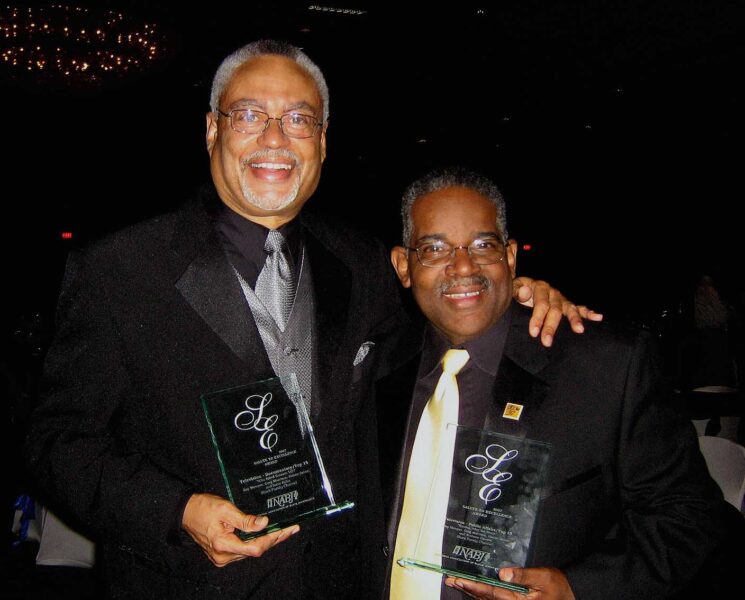
Ray Metoyer Dies at 72, Mentor and NABJ Exemplar
“When I was a reporter in Denver, there was an ongoing story about a rapist who was preying on women in the Capital Hill area,” the late Ray Metoyer wrote in his blog.
“Police called a news conference to announce a breakthrough in the investigation and our station was there covering it live. The police chief told us they had a new description of the suspect. The man was described as a ‘light-skinned’ black male, 25-40 years old, weighing between 180-230 pounds and about 6’4” tall’. As I was taking notes I realized all of the white reporters were peeking in my direction, because I matched this general description.”
“I quickly raised my hand on live TV and asked, ‘Excuse me chief, do you realize that you’ve just made suspects out of nearly half of the Black male population in Denver? I mean, I match this vague description! Can you be more specific, or should I turn myself in for questioning?’ “
Metoyer went on in his 2013 posting, “My question left the chief flustered since reporters rarely challenged these vague descriptions of black suspects. It became even more confusing later when the cops solved the case, with the arrest of a very brown-skinned, black man. It turns out the original description came from a ‘dark skinned’ police detective, who interviewed a rape victim. She said she was raped by a man, much lighter than the dark skinned detective, so the detective called the suspect ‘light skinned’.
“But the guy they arrested had a skin color somewhere between Denzel Washington and Will Smith, darker than most Caucasians and lighter than most Africans. What we need are more official police sketches of suspects, not someone’s very subjective idea of what is light or dark. . . .”
Metoyer died Friday in Atlanta. He had just celebrated his 72nd birthday on July 10. “Five years ago he was diagnosed with Kidney cancer and was treated,” his good friend, fellow journalist Greg Morrison, messaged Journal-isms. “He was in remission for a while before it recurred two years ago.”
As the National Association of Black Journalists noted Saturday in its announcement of Metoyer’s passing, “He anchored and produced newscasts in the Denver, Houston, Atlanta, Greenville, and Spartanburg, South Carolina television markets. He also was a pivotal force behind the news operations at The Black Family Channel and Soul of The South.
“Metoyer owned the production company Townhall Productions in metro Atlanta, producing and developing content for an array of companies.”
For many, though, Ray was the exemplar of a Black journalist, active in NABJ and with the requisite mindset, as demonstrated in his comments about police descriptions of “light” and “dark” suspects and his use of media to make his opinion known.
Metoyer tweeted in 2018, “I’m tired of the term ‘Underprivileged Communities’! Being poor or low-income is not a privilege! We need to be talking about “OVER-privileged Communities”!
“It is difficult to find anyone more dedicated to NABJ than Ray. Everyone loved Ray because of his engaging personality and commitment to excellence. We will miss him dearly,” NABJ President Dorothy Tucker said in the association’s announcement.
“Metoyer’s dedication to NABJ and the journalism industry was deep and sustained from the time he joined NABJ in 1979. He is a former national NABJ Board member and former co-chair of the NABJ Salute to Excellence Awards Judging Committee. He most recently served as the 2022 NABJ Elections Committee Chair and previously served as an NABJ chapter president in Omaha, Denver and Atlanta.”
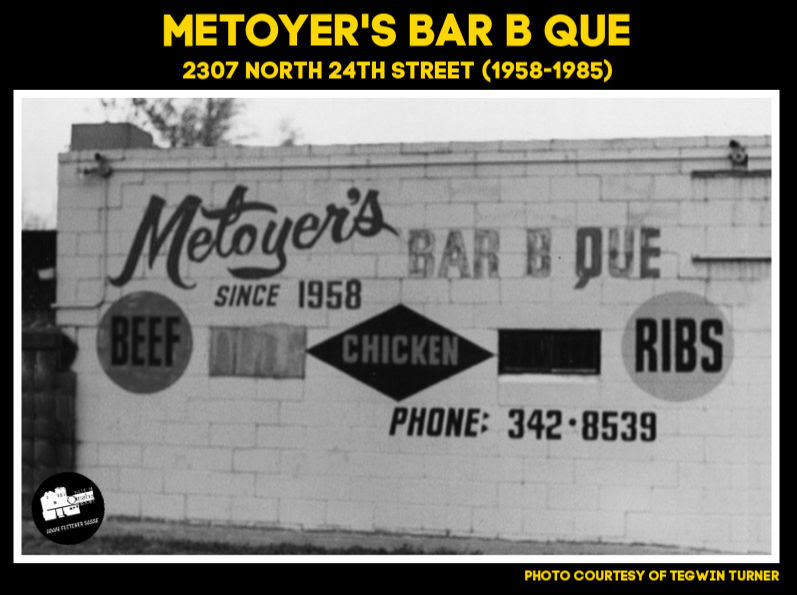
A native of Omaha, Neb., Metoyer’s family members were co-owners of a barbecue restaurant located near clubs and dance halls in the center of North Omaha’s African American community. In 1979, Metoyer’s dad, Raymond F. Metoyer (1928-1979), was shot and killed while working, and his journalist son took over the restaurant. It closed in 1985 after Metoyer moved to Denver, according to a history of North Omaha. The next year Metoyer became a reporter and anchor at Denver’s KUSA.
At the now-defunct Black Family Channel, Metoyer wrote on LinkedIn, “I was responsible for overseeing the production of all news content for the network — including news and entertainment specials. Documentaries included specials on Della Reese, the movie ‘Ray’, the murder of Emmett Till, the 40th anniversary of the King assassination, and the funeral of Coretta [Scott] King. Also helped to produce a live, daily, one hour newscast for the network.”
In his most recent role, his Townhall productions produced and developed programs and content for individual clients or companies. “We are currently working on documentary projects, movie proposals and other content development,” Metoyer wrote.
He had joined NABJ in 1979. Metoyer served on the NABJ board as a regional director from the Midwest. In Atlanta, he was a three-time president of the local chapter.
Metoyer variously described himself as “media professional, consultant, freelance journalist, blogger, multi-media producer, photographer, mentor” and “producer, director, writer, researcher, team builder.”
News of his passing unleashed a torrent of comments on social media. “He was a wonderful mentor to me and many other journalists as we got into the business,” wrote Sheeka Sanahori, travel journalist and video producer.
“Ray was one of the first people who welcomed me with open arms when I attended my first NABJ Convention in Atlanta in 2005. The impact he made in Atlanta and the nation will never be forgotten,” said Karvis Jones, sports editor at Bally Sports South in Atlanta. Several called Metoyer a “class act.”
“He loved creating music and cooking as much as he did journalism,” wrote his good friend Stan Washington of the Atlanta Voice. “He enjoyed a good conversation and or debate.”
A memorial service will be announced in a couple of weeks, Washington said.
Walter Middlebrook, veteran journalist and member of the Michigan Journalism Hall of Fame, told Facebook friends, “Losing Ray Metoyer pretty much closes the book on our Sunday Breakfast Club that gathered at the annual NABJ convention away from the crowd to hug, share the love and set the stage for our meeting at the next confab.
“Our small group – formed when Joe Palmer of St. Louis, Ray of Omaha and me of the Twin Cities were the brothers from [REGION 8] — would stay at the host city long past when everyone had headed home. . . .”
And DeWayne Wickham, an NABJ co-founder and former president, wrote, “OMG. Ray was a good brother and longtime NABJ member. Coming on the eve of the NABJ Convention, this is a chilling reminder that while life is fleeting, NABJ’s memory of its most committed members should be long-lasting.”

NABJ Hosting Sessions on Martha’s Vineyard
The National Association of Black Journalists is holding an “NABJ on the Vineyard” event — that’s Martha’s Vineyard — Aug. 8 and 9, just days after its annual convention, which takes place Aug. 2-6 this year in Birmingham, Ala.
The event is intended for those who are already at the Massachusetts vacation spot, a favorite for many African Americans, NABJ President Dorothy Tucker told Journal-isms Monday.
There is no charge. The Tuesday session, “Fake or Fact: Learning How to Spot Misinformation Online,” is to be a luncheon event for teen-agers at the Oak Bluffs Public Library, and is co-sponsored with NBCUniversal and ABC News. The speakers, Byron Pitts of ABC News and Rehema Ellis of NBC News, were already planning to be at the Vineyard, Tucker said. The student event should attract 30 or 35 people, Tucker said.
The next day’s program, “Truth Be Told: Democracy in Crisis,” is being held at the Union Chapel Education and Cultural Institute, also on Oak Bluffs. The chapel holds about 300 people, Tucker said, and that many are expected. Tucker said the two events are considered outreach. The goals: For students, learning more about how to identify “fake news” and to possibly inspire some to become journalists; the larger gathering to underline the importance of a free press and to explain to “a larger market” what journalists do.
Tucker said she had the idea after being on the Vineyard a few years ago and began talking with Charles Sennott, founder and editor-in-chief of Report for America, a national service program that places journalists into local newsrooms to report on under-covered issues and communities.
“Let’s take NABJ to the next level,” she said. “Let’s broaden our reach” as NABJ prepares for its 50th anniversary in 2025. Report for America signed on and the two organizations decided to partner in the project.
Easier for the Rich to Be Admitted, Study Shows
“Elite colleges have long been filled with the children of the richest families: At Ivy League schools, one in six students has parents in the top 1 percent,” Aatish Bhatia, Claire Cain Miller and Josh Katz reported Monday for The New York Times.
“A large new study, [PDF] released Monday, shows that it has not been because these children had more impressive grades on average or took harder classes. They tended to have higher SAT scores and finely honed résumés, and applied at a higher rate — but they were overrepresented even after accounting for those things. For applicants with the same SAT or ACT score, children from families in the top 1 percent were 34 percent more likely to be admitted than the average applicant, and those from the top 0.1 percent were more than twice as likely to get in. . . .”
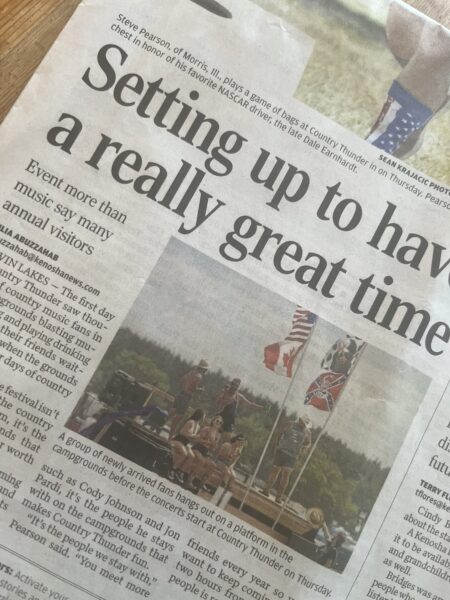
Reporter Called N-Word Covering Country Concert
In Wisconsin, “A TMJ4 reporter was ‘left humiliated’ while reporting from Country Thunder’s opening night in Twin Lakes Thursday after being yelled at and subjected to a racist slur,” Piet Levy reported Friday, updated Saturday, for the Milwaukee Journal Sentinel.
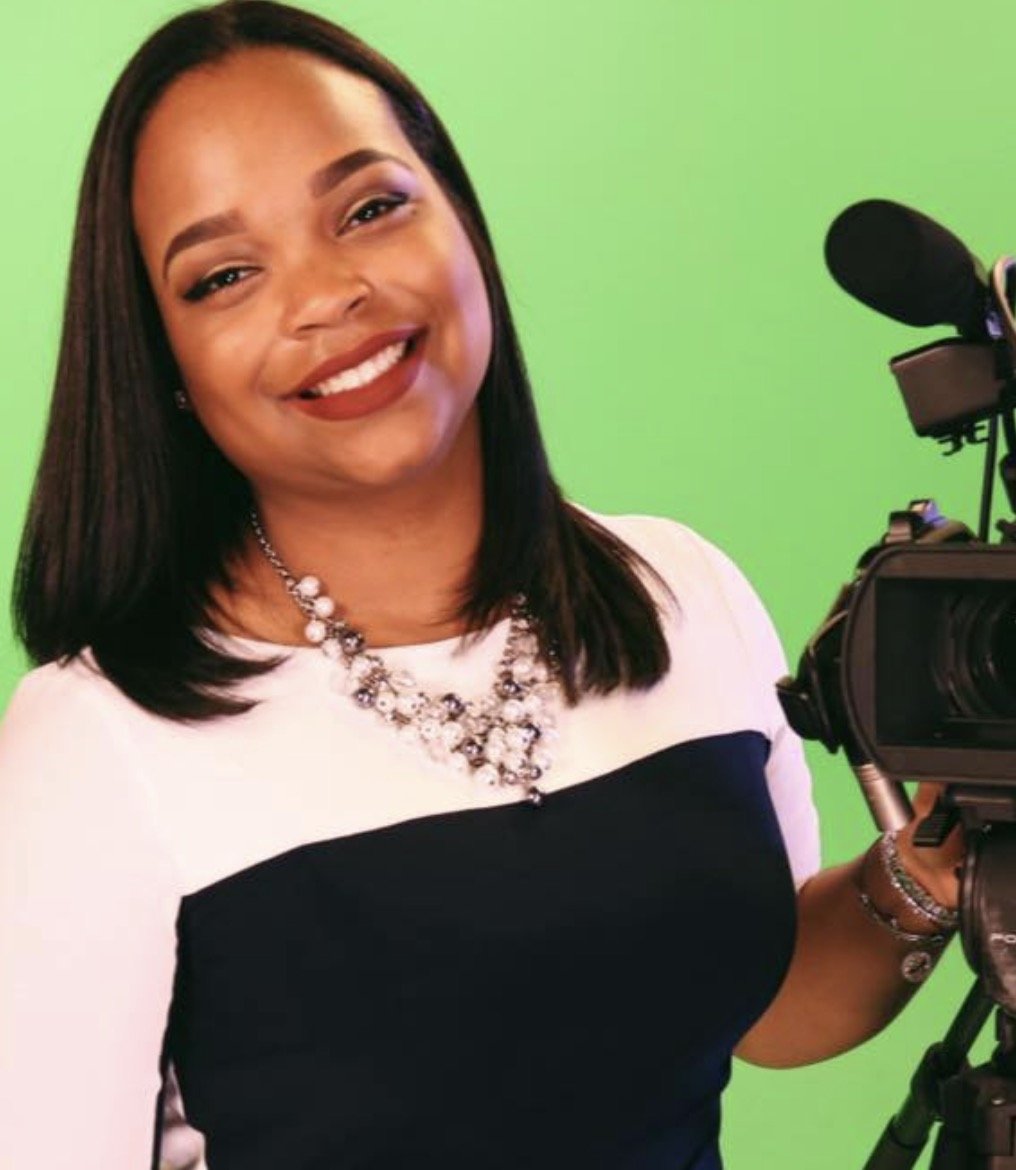 “Taylor Lumpkin (pictured), a Black multimedia journalist for WTMJ-TV (Channel 4) since 2020, tweeted Thursday night that ‘a guy ran up and yelled at me (unprovoked), and called me a N* twice. No one helped. Everyone stared at me, and laughed.
“Taylor Lumpkin (pictured), a Black multimedia journalist for WTMJ-TV (Channel 4) since 2020, tweeted Thursday night that ‘a guy ran up and yelled at me (unprovoked), and called me a N* twice. No one helped. Everyone stared at me, and laughed.
” ‘Do better people,’ the tweet said.
“The Journal Sentinel has reached out to Lumpkin, and a spokesperson for Country Thunder, for further comment.
“Joe Poss, vice president and general manager for TMJ4, issued a statement Friday to the Journal Sentinel.
” ‘We are appalled that one of our reporters was subjected to a racial slur while producing a news story. We stand against all forms of racism and have a core commitment to equity, diversity and inclusion,’ Poss said. ‘What happened to Taylor Lumpkin at a music festival should not happen to anyone, anywhere. It is painful and heartbreaking when something awful like this occurs. Our focus right now is on supporting Taylor.’
“Lumpkin’s initial tweet had been viewed more than 642,000 times as of Friday afternoon, and garnered a response from the Council on American-Islamic Relations, the Muslim civil rights and advocacy organization also known as CAIR.
“ ‘We condemn the alleged racist verbal assault on Ms. Lumpkin and urge all those who either engaged in this cowardly behavior or failed in their duty to repudiate bigotry to reflect on the harm racism does to individuals and to the larger society,’ Ibrahim Hooper, CAIR National Communications Director, said in a statement issued Friday.
“It wasn’t the only racist incident reported from the festival’s first day, with the Kenosha News running a photo on the front page of Friday’s edition that showed fans flying a Confederate flag at the festival’s campgrounds on Thursday. . . .”
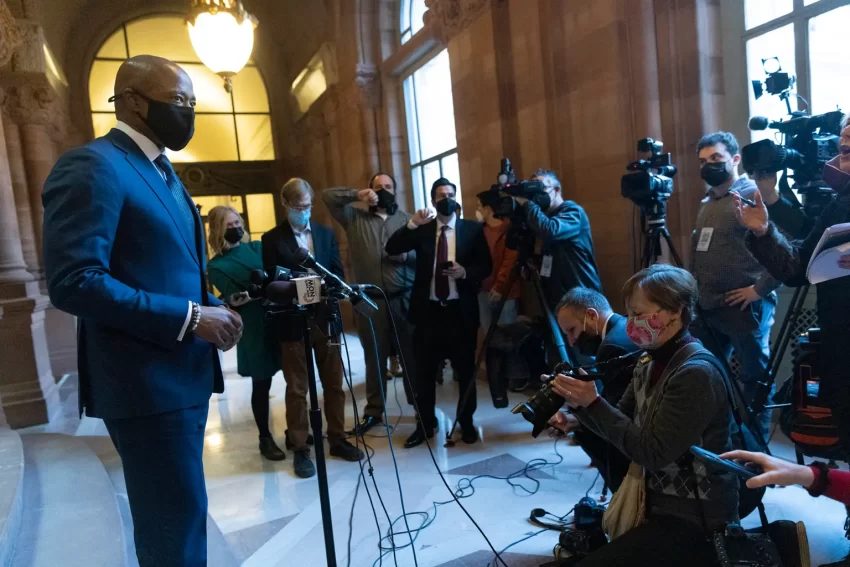
N.Y. Mayor Wants $500,000 to Promote J-Diversity
“New York City Mayor Eric Adams and the Mayor’s Fund to Advance New York City today announced a new scholarship fund to expand access to educational opportunities for New York City students of color and increase diversity within journalism,” the city declared Friday.
“New York City’s reporters play an essential role in delivering news to the city’s residents, elevating voices, and holding those in power accountable. This scholarship initiative will build a pipeline to ensure more New Yorkers — especially those of different backgrounds who are not as often represented in the media — can join this vital industry.
“Mayor Adams and the Mayor’s Fund set a first-year target to raise at least $500,000 for the scholarship fund that will allow students of color from New York City to support their undergraduate and graduate studies in journalism. People can donate directly to the fund to help support scholarships for students of color online.
“ ‘From Ida B. Wells to Jovita Idár, journalists of color have used the power of the press to shine a light on urgent issues and push our country forward. Unfortunately, too many newsrooms still do not look like the communities they cover, with Black, Brown, Asian-American, and so many other communities underrepresented in our press corps,’ said Mayor Adams. ‘This scholarship fund for students of color will help support students from New York City as they work to repair the inequities we’re seeing in newsrooms, building new pipelines for students to become journalists and increasing the diversity of this essential industry.’ . . .”
In February 2022, Adams undertook what the New York Post called an “epic rant” in which he “threatened to stop fielding ‘off-topic’ questions at his press conferences — and blasted the Big Apple’s news organizations over what he said was their lack of racial diversity,” Nolan Hicks, Sam Raskin and Bruce Golding reported then for the Post.
- Sharelle Burt, Black Enterprise: NYC Mayor Eric Adams’ Popularity Takes a Nosedive Among Black Voters (June 29)
- Leonard Greene, Daily News, New York: Mayor Adams pushes newsroom diversity with scholarships for NYC students
To subscribe at no cost, please send an email to journal-isms+subscribe@groups.io and say who you are.
Facebook users: “Like” “Richard Prince’s Journal-isms” on Facebook.
Follow Richard Prince on Twitter @princeeditor
Richard Prince’s Journal-isms originates from Washington. It began in print before most of us knew what the internet was, and it would like to be referred to as a “column.” Any views expressed in the column are those of the person or organization quoted and not those of any other entity. Send tips, comments and concerns to Richard Prince at journal-isms+owner@
View previous columns (after Feb. 13, 2016).
View previous columns (before Feb. 13, 2016)
- Diversity’s Greatest Hits, 2018 (Jan. 4, 2019)
- Book Notes: Is Taking a Knee Really All That? (Dec. 20, 2018)
- Book Notes: Challenging ’45’ and Proudly Telling the Story (Dec. 18, 2018)
- Book Notes: Get Down With the Legends! (Dec. 11, 2018)
- Journalist Richard Prince w/Joe Madison (Sirius XM, April 18, 2018) (podcast)
- Richard Prince (journalist) (Wikipedia entry)
- February 2018 Podcast: Richard “Dick” Prince on the need for newsroom diversity (Gabriel Greschler, Student Press Law Center, Feb. 26, 2018)
- Diversity’s Greatest Hits, 2017 — Where Will They Take Us in the Year Ahead?
- Book Notes: Best Sellers, Uncovered Treasures, Overlooked History (Dec. 19, 2017)
- An advocate for diversity in the media is still pressing for representation, (Courtland Milloy, Washington Post, Nov. 28, 2017)
- Morgan Global Journalism Review: Journal-isms Journeys On (Aug. 31, 2017)
- Diversity’s Greatest Hits, 2016
- Book Notes: 16 Writers Dish About ‘Chelle,’ the First Lady
- Book Notes: From Coretta to Barack, and in Search of the Godfather
- Journal-isms’ Richard Prince Wants Your Ideas (FishbowlDC, Feb. 26, 2016)
- “JOURNAL-ISMS” IS LATEST TO BEAR BRUNT OF INDUSTRY’S ECONOMIC WOES (Feb. 19, 2016)
- Richard Prince with Charlayne Hunter-Gault, “PBS NewsHour,” “What stagnant diversity means for America’s newsrooms” (Dec. 15, 2015)
- Book Notes: Journalists Follow Their Passions
- Book Notes: Journalists Who Rocked Their World
- Book Notes: Hands Up! Read This!
- Book Notes: New Cosby Bio Looks Like a Best-Seller
- Journo-diversity advocate turns attention to Ezra Klein project (Erik Wemple, Washington Post, March 5, 2014)

